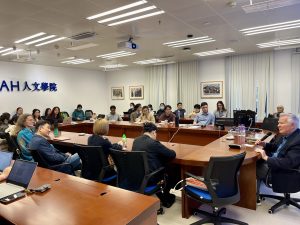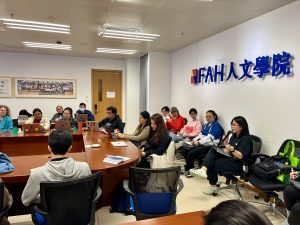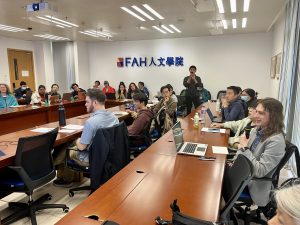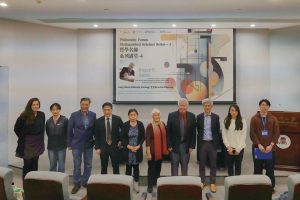
On 14th March, the Institute of Advanced Studies in Humanities and Social Sciences (IAS) and the Department of Philosophy and Religious Studies of the University of Macau (UM) presented the fourth “Philosophy Forum of Distinguished Scholars Series”.
由澳門大學人文社科高等研究院(下簡稱“高研院”)與人文學院哲學與宗教學系聯合主辦的第四次“哲學名師系列講堂”於 3 月 14 日成功舉辦。
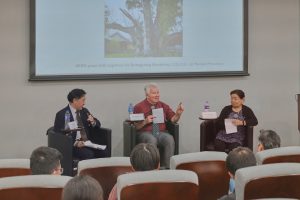
The lecture featured Roger T. Ames, Humanities Chair Professor at Peking University, Senior Academic Advisor of the Peking University Berggruen Research Center, as the speaker. Professor Ames delivered a lecture titled “Living Chinese Philosophy: ‘Zoetology’ as First Philosophy”, with Professor Xingzhong Yu, Director of IAS and Chair Professor of FLL, as the moderator of this forum, and Professor Ellen Zhang from the Department of Philosophy and Religious Studies of FAH as the commentator.
北京大學哲學系人文講席教授、北京大學博古睿學者安樂哲先生以“活的中國哲學:作為第一哲學的生生論(Zeotology)”為題發表演講,高研院院長、法學院環球法律學系於興中教授擔任主持人,哲學與宗教學系張穎教授擔任與談人。
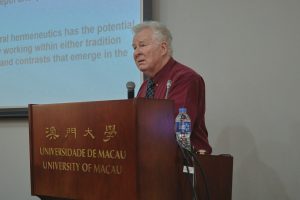
Professor Ames introduced two ways of thinking: the ontological one from western philosophy tradition, and the “zoetological” one that he summarized for Chinese philosophy from the perspective of philosophical hermeneutics. He emphasized the Chinese philosophy embodies “Sheng” (life, live, growth) as “procreative living that is meant by change”(生生之謂易) and “procreative living is without end”(生生不已), revealing that “for Chinese people, the cosmos is nothing more than a continuous stream, a kind of flow, and a continuing process.” Then, Professor Ames argued that Western philosophy deals with necessity while Chinese philosophy tackles with possibility. The former provides a dictionary or lexicon for understanding the world, but the latter provides a “grammatical” explanation for the world, which is an understanding of the “Du”(度).
安教授介紹了兩種思維方式,其一是作為古希臘哲學傳統的“存在本身的科學”——“本體論”;其二是安樂哲教授從中國哲學視角總結為“生生論”的新視角。安教授著重強調了《易經》中的“生生之謂易”和“生生不已”,認為“中國人心目中宇宙只為一種流行,一種動態,一種過程”,而後又分別從思想主旨、思想結構方面進行比較,指出西方哲學是關於必然性的思想,而中國哲學是關於可能性的思想;西方哲學是對世界的“字典式”解釋,中國思想則是對世界的“語法式”解釋,是對“度”的把握。
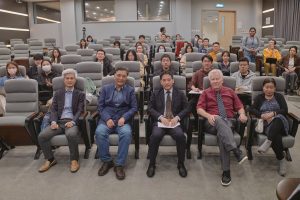
This lecture provided a new perspective for the comparative studies of Chinese and Western philosophy. In the Q&A session, Professor Ames engaged in in-depth discussions with UM students and faculty members, bringing the forum to a successful conclusion.
本場講座為聽眾帶來了新的中西方哲學比較研究視角,吸引了現場眾多師生與學者積極參與。問答環節現場澳大師生與安樂哲教授關於個別問題進行了深入探討,現場交流十分精彩。
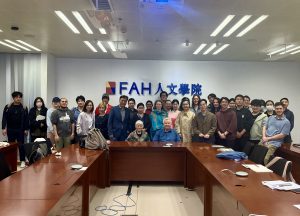
On 15th March, Professor Ames attended the “Translating China” workshop held by the Department of Philosophy and Religious Studies. He laid out the fact that Chinese philosophy was introduced into Western academy through missionaries, and it was the reason the translations depend heavily on Church’s vocabularies. Hence western scholars are hard to understand Chinese philosophy from and within its own context. Professor Ames advocated for understanding Chinese philosophy on its own term. To do so, he recently published a conceptual lexicon for Chinese culture with the hope that it could be a useful tool for understanding Chinese philosophy to aid in accurate translations and comparative studies.
次日,安教授參加了哲學與宗教學系開展的“翻譯中國”的研討會。會上,安教授強調中國哲學是由西方傳教士引入西方學術界的,因此其翻譯大量引用了基督教術語,導致研究者們並非在中國文化的語境下進行理解,而是基於西方的宇宙觀對它們進行闡釋。為了更好地理解中國哲學,研究者需要借助跨文化類比闡釋以恢復原文化的語境。以此為出發點,安教授新近出版了一套著作,梳理和整理一套描述中國文化的關鍵詞彙,希望新一代學者能有更好的工具以更深入地理解中國哲學和文化。
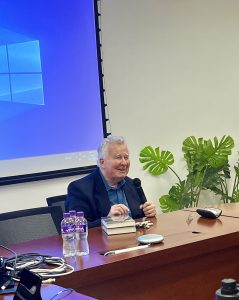
During the workshop, Professor Ames shared his translation experiences and discussed strategies for effective cross-cultural translation with students, creating a lively and engaging atmosphere.
此外,安教授還分享了自己在翻譯方面的理解和經驗,與系裡的同學們討論如何做出令人滿意的翻譯。眾多同學參與其中,研討會在輕鬆愉快的氛圍中落下帷幕。
